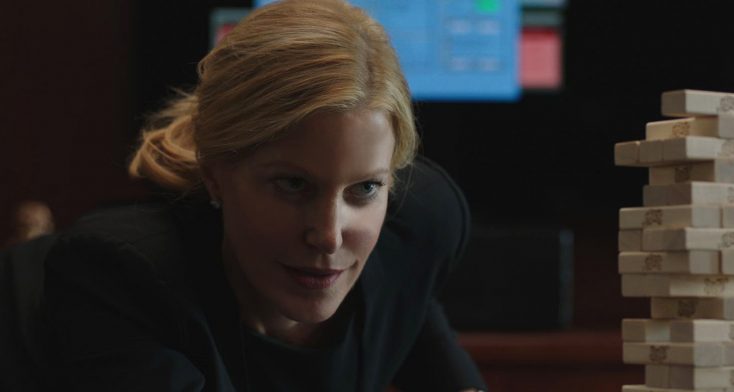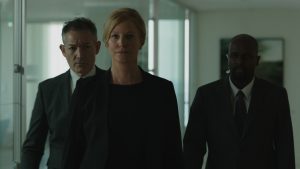By ANGELA DAWSON
Front Row Features
HOLLYWOOD—For five seasons, Anna Gunn played the oblivious and then complicit partner to her chemistry teacher turned crystal meth producing husband on the acclaimed AMC series “Breaking Bad.” Twice she won Emmy awards for her supporting performance as Skyler White.
Now, the statuesque blond is a corporate bigwig in the big screen drama “Equity,” a kind of female “Wall Street.”
Written by Amy Fox from a story by Sarah Megan Thomas (“Backwards”) and Alysia Reiner (“Orange is the New Black”), who also co-star in the post-financial crisis drama, “Equity” is directed by Meera Menon, whose previous feature was the indie “Farah Goes Bang.”
Gunn, a native of New Mexico, is no stranger to strong female roles. She played no-nonsense detective Ellie Miller on Fox’s short-lived “Gracepoint,” and previously played hardy frontierswoman Martha Bullock on the popular HBO western “Deadwood,” for two seasons. She is set to reprise the latter in an upcoming movie based on the series.
The 47-year-old actress, who is a mother of two daughters, says she was attracted to this female-driven drama because she hadn’t seen anything quite like it made into a film before. She plays Naomi Bishop, a successful investment banker who has climbed high on the corporate ladder at a competitive Wall Street firm, driven to success by her humble upbringing and natural intelligence. However, having experienced her first professional stumble with a botched IPO, she’s somewhat skittish about heading into her next one. Naomi must overcome self-doubt, second-guessing, threats to her power from outside and from within her own firm to navigate her way out of crisis. In the process, she reassesses her priorities and goals and tries to help another young woman (Thomas) up the ladder. In addition to Thomas and Reiner, the film also stars James Purefoy, as Naomi’s mentor and sometime lover.
Gunn recently spoke about playing a powerful woman in the financial world and how that competitive industry sometimes parallels the experience of women in Hollywood.
Q: What did you think of the script?
Gunn: When I sat down to read it, I read it in one fell swoop. I’d never seen a movie as intricate in terms of getting into the ins and outs and grey lines in terms of women in the lead positions. You get to see into their lives and see them tick. For me, that’s the most exciting thing whether it’s a Wall Street movie or another subject matter. When you get to your ethics, your morality and what you’re willing to do wherever you want to go.
Q: What appealed to you about Naomi?
Gunn: Her whole life has been wrapped around that goal of getting higher and higher (on the corporate ladder). When you meet her at the beginning of the movie where she’s hit the apex and is just beginning to fall. She’s had her first real failure and she’s trying to climb back up the ladder but she’s starting to slip. When doubt creeps in, you start to lose your power. You start to lose your game. This is a story about a woman where this has been her entire goal and now she realizes that maybe this isn’t the goal for her. Watching a woman of that age say I’m going to go do something else now is a very powerful thing. That moment said it.
Q: Have you had experiences like the character in the movie?
Gunn: What I found fascinating is that there’s a game you have to play as a woman in both of these industries. I found it fascinating talking to (co-producers) Barbara Byrne, Candy Straight and other women who were kind enough to share their experiences because so many of their stories and experiences fed into this movie and helped to create and shape these characters and the story. Listening them talk about having to message a room and having to ride that thin line between being tough and soft, and I remember one person telling me when she had her performance review—we don’t have those in Hollywood. Well, we do, but in a different way. She said that when she went into a room and trying to show that you’re not a pushover and you’re not going to be so sweet and you’re not going to be the girl that nods and says yes, then you’re kind of pushed out of the way. If you come in and have your own ideas and opinions and you’re tough about it, you can be perceived as a *****, frankly. The same thing occurs when you’re trying to navigate your behavior in a room or on a set in Hollywood.
You know that you’re riding a line that men don’t have to think about. If you have an opinion and you want to voice it, and you feel strong about it, you have to be careful in how you present it. That’s something that (our producers) talked about a lot and that helped me in terms of creating the character of Naomi. She knows how to handles the boys, in essence, and she knows how to handle the women she works with. That’s a real fine line.
Q: What message do you hope to get across with this film?
Gunn: That’s why the three women, and the interactions they have, and the intentions and the motivations they have, and the personal situations and the lives they have to balance with work—it’s not to say that if you’re a married man who has children who has a job that takes you on the road a lot or you’re working incredibly long hours, that’s tough as a man. But, as a woman, there’s a gender situation, where they feel really guilty when they’re working these kinds of jobs. On set in Hollywood, you’re working 15-16 hours if it’s a really long day. Your kids are waiting at home and sometimes you’re not there to put them to bed. Sometimes you have to leave at 4:30 a.m. to hit your set call. You don’t get to say “Good morning,” to your kids. That weighs more heavily on women then it does on men. It’s something women have to think about during their career. What will happen if they have a baby and have to take time off? They wonder if they’re pushing as hard as they need to. Will I lose my career? Will I not get the next promotion? Will I not get the next step up? We all have children and it’s something we talked about while filming. It’s a balance act that’s something that men don’t necessarily need to deal with.
Q: There’s a message about the women were corrupted by the system of the business world?
Gunn: It’s the idea of mentorship. When I talked to all the women who not only invested in the film, but also invested their time in sharing their lives with us, it was something they pointed out as important as women supporting other women, mentoring them and helping to bring them up. That was important to them. However, there are very few positions for women as you move up the ladder so that cutthroat world exists. It says to me what occurs in the female culture. If there were only three positions open, what would you do to get where you want to go and what would you give up. When Naomi discovers Erin (Thomas) is pregnant, she thinks, “I could have done this but I didn’t do it. I chose the other path. What did I miss out on?” Her journey becomes this has been my sole focus throughout my life. I haven’t seen my family. I have a fish. (She laughs.) There’s that moment of the road not taken.
Q: What research did you do on the financial industry and did you have a lot of time to do it?
Gunn: I didn’t have a lot of time and I’m a research junkie. But I had enough time, and I had a lot of help from Meera (Menon, the director) and a good call with Alysia and Sarah before we met in person, and got to know a lot about their development process and how they came about telling the story. They put me on the phone with Barbara Byrne. She’s a lioness, a legend in her own time. She spent two hours with me on the phone. And then I spent a day in New York. My father was a stockbroker in Cleveland before we moved to New Mexico, so he was able to help me as well. He was very excited that I was playing this role. I was lucky to be able to talk to a variety of women in the professional setting and then we had dinner together, so there were two different sides that I got to see. I relied on them to let me know if I was going down the right path with certain things about how you present yourself professionally, how you pitch an IPO, how you take that to fruition, how you seduce the room without being too girly. It’s that whole balancing act that’s important. Watching their personalities. There were similarities and difference about the way they went through their journey and the way they got to the top.
Q: What did you discover about the financial industry in your discussion with senior level women in it?
Gunn: It was interesting to listen to people stories about how they got into the industry. That was important to me for the character because going into a profession that’s dominated by men, and wanting to go into that and the reasons for it, they were very specific. What’s interesting is one person said that generally, there’s the person who came from very little and growing up in that money speech made so much. When you grow up with nothing, the drive is built into you and it’s a driving passion. Other people may have family members, where it’s a legacy situation. My character, Naomi, came from nothing. She had to support her family and found a way to do it.
Q: You’ve wrapped production on Clint Eastwood “Sully,” about hero pilot Chesley “Sully” Sullenberger. What was that experience like?
Gunn: It was amazing. Clint doesn’t say, “Action!” He says, “Whenever you’re ready.” Sometimes you don’t know when they’re rolling because they’re so calm. He’s been working with the same people for a long time. He also doesn’t say, “Cut!” He goes, “Alright.” Sometimes he’ll say, “That’s enough of that.” (She laughs.) Which is hilarious. It was very very exciting. It was a completely different animal (from “Equity”) but working with Clint Eastwood, what can you say, it’s a dream come true.
I’m going on probably if this works out then the rumor of the “Deadwood” movies is coming true. And the two “Deadwood” movies are next. I get to go back into a corset. Yeah, after playing this modern woman at the top of her industry and put back on the corset and remember how far we’ve come. (She laughs.)






